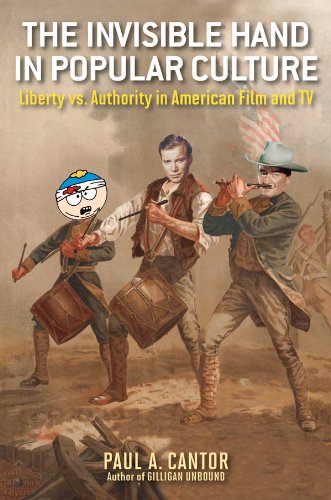
By Paul A. Cantor
Popular tradition frequently champions freedom because the essentially American lifestyle and celebrates the virtues of independence and self-reliance. yet movie and tv have additionally explored the strain among freedom and different middle values, similar to order and political balance. What might appear like fit, effective, and artistic freedom from one standpoint may well seem like chaos, anarchy, and a resource of damaging clash from one other. movie and tv always pose the query: Can americans care for their difficulties on their lonesome, or needs to they depend upon political elites to control their lives?
In this groundbreaking paintings, Paul A. Cantor explores the ways that tv exhibits comparable to Star Trek, The X-Files, South Park, and Deadwood and movies corresponding to The Aviator and Mars assaults! have portrayed either top-down and bottom-up versions of order. Drawing at the works of John Locke, Adam Smith, Alexis de Tocqueville, and different proponents of freedom, Cantor contrasts the classical liberal imaginative and prescient of the USA -- relatively its emphasis at the virtues of spontaneous order -- with the Marxist realizing of the "culture undefined" and the Hobbesian version of absolute nation control.
The Invisible Hand in well known Culture concludes with a dialogue of the influence of 9-11 on movie and tv, and the hot anxieties rising in modern alien-invasion narratives: the terror of an international technocracy that seeks to break the extended family, non secular religion, neighborhood govt, and different conventional bulwarks opposed to absolutely the state.
Read Online or Download The Invisible Hand in Popular Culture: Liberty vs. Authority in American Film and TV PDF
Best tv arts & entertainment books
Batman (TV Milestones Series) - download pdf or read online
ABC’s action-comedy sequence Batman (1966–68) famously provided a twin tackle in its wildly renowned portayal of a comic hero in a reside motion layout. young children uncritically authorised the show’s plots and characters, who have been guided via lofty beliefs and social values, whereas adults reacted to the transparent parody of the values on show.
Markus Wiemker's Trust no Reality: Eine soziologische Analyse der X-Files PDF
Magisterarbeit aus dem Jahr 1998 im Fachbereich Soziologie - Klassiker und Theorierichtungen, observe: 1,0, Rheinisch-Westfälische Technische Hochschule Aachen (Institut für Soziologie), ninety six Quellen im Literaturverzeichnis, Sprache: Deutsch, summary: A. Relevanz und Darstellung I. textual content und Kontext„The X-Files is a made from its time now not since it holds a replicate to fact yet since it displays the approach of its era:.
Through the long-running BBC sequence healthcare professional Who, the general practitioner has hardly been alone—his partners are crucial. Male or (mostly) woman, alien or (mostly) human, younger or outdated (none as outdated as he), the handfuls of partners who've travelled with him during the last 50 years have served as sympathetic proxies for the viewers.
New PDF release: May the Armed Forces Be with You: The Relationship Between
Technological know-how fiction and the us army frequently inhabit a similar imaginitive house. guns expertise has taken proposal from technological know-how fiction, from the bazooka and the atomic bomb to weaponized lasers and drones. Star-spangled superheroes bought warfare bonds in comedian books despatched to GIs in the course of global warfare II, and embellished the noses of bombers.
- Television and the Moral Imaginary: Society through the Small Screen
- Communication Technology Update and Fundamentals: 15th Edition
- Of Elephants and Toothaches: Ethics, Politics, and Religion in Krzysztof Kieslowski's 'Decalogue'
- Making Media Content: The Influence of Constituency Groups on Mass Media (Routledge Communication Series)
- Enviro-Toons: Green Themes in Animated Cinema and Television
Additional info for The Invisible Hand in Popular Culture: Liberty vs. Authority in American Film and TV
Sample text
The Invisible Hand in Popular Culture: Liberty vs. Authority in American Film and TV by Paul A. Cantor
by Richard
4.5



